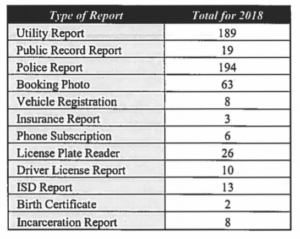Reporters Notebook: APD on ICE
Monday, March 4, 2019 by
Austin Monitor Life after SB 4… Following Texas’ Senate Bill 4, also known as the “Sanctuary City bill,” Austin City Council asked that all instances of city collaboration with Immigration and Customs Enforcement be tracked. A Feb. 28 memo from Austin Police Chief Brian Manley sheds light on events from 2018, revealing, “There were 581 instances where APD provided information in response to requests for assistance or cooperation from a federal immigration officer. Prior to releasing the information, the requesting agency must provide APD with a case number, name of the investigator assigned, the criminal nexus, and the crime type (e.g. Aggravated Assault, Robbery, DWI, etc.).”

In addition, according to the memo, there was one instance where APD inquired about a detainee’s or arrestee’s immigration status and four instances where APD assisted ICE, at a cost of $3,968.91.
Soon after release of the memo, Council Member Greg Casar – who was arrested protesting SB 4 in 2017 – released a statement that read, in part, “The first report released today to Council by APD shows that the department assisted or cooperated with immigration officers at least 581 times. As the lead sponsor of the Freedom Cities resolution that initiated this report, I have made repeated attempts to receive basic information from City Management and APD over the last week about how much of this ICE cooperation was forced, how much was discretionary, and whether or not these efforts fully complied with our ‘Freedom City’ policy. Despite my best efforts, I have not been given this information.
This report clearly shows why immigrants in our community describe being scared of interacting with the police department or with government in general. These instances of ICE collaboration may have been forced by SB4, some of them may reflect a misuse of the city’s power to support deportations. Our community deserves a government that is truly responsive to the needs of our immigrant neighbors, and deserves transparency from the city.”
Download (PDF, 467KB)
Take a hike?… The first weekend of March was the first official weekend the River Place neighborhood began charging non-neighborhood residents a $10 fee per person and animal to use the River Place Nature Trail. Amid much news coverage and unhappy Austinites, Parks and Recreation Board Member Richard DePalma went out to the trail himself to see the potential financial ramifications this new charge would have on families. At the Feb. 26 meeting of the Parks and Recreation Board, he reported to board members that families from all over the city and surrounding municipalities came to hike this particular trail in far Northwest Austin. “It is one of the most diverse hikes in the city,” agreed Board Member Dawn Lewis, who said she has hiked the trail on multiple occasions. “The amount of money they are asking people to spend is just a deterrent. You can’t really frame it as anything else,” she said. DePalma mentioned that the neighborhood had received a grant from Texas Parks and Wildlife in order to help build the trail. According to him, the non-resident charge could be a possible violation of that grant. Additionally, he said, “I’m investigating whether or not we’ve made concessions as a city.” Currently, the neighborhood is in a limited district, which in effect makes it an independent governmental agency that manages parks and recreational facilities. DePalma noted that its status is up for renewal this fall, at which time the city will have the authority to force its hand and push for full annexation. That will allow for full control of the parkland in the district as well as the cancellation of the $10 public trail charge. However, for the time being, the trail will now require payment for use of the outdoor space.
Smoot point… The Flower Hill or Smoot House, which is located in Old West Austin, is a homestead from 1877 that was once composed of five acres and a nine-bedroom home. From its construction until 2013, three generations of the Smoot family lived within the walls of the domicile and all worked as civil servants. Two Smoots served on the Texas Supreme Court and two others were the founding teachers at Austin High School and William B. Travis High School. Recognized as a Texas Historic Landmark in 1965, the home is now a museum that is open for events and scheduled tours. However, come fall 2019, the Flower Hill Foundation plans to open one of the city’s last historic homesteads to the public on a more regular basis. Now in its final round of permitting, the property where O. Henry eloped will soon be open for regular tours by the public. Of course, due to land demand in the city, the property now consists of 1.38 acres, not five.
This week’s Reporters’ Notebook comes from the Notebooks of Jessi Devenyns and Elizabeth Pagano.
The Austin Monitor’s work is made possible by donations from the community. Though our reporting covers donors from time to time, we are careful to keep business and editorial efforts separate while maintaining transparency. A complete list of donors is available here, and our code of ethics is explained here.
You're a community leader
And we’re honored you look to us for serious, in-depth news. You know a strong community needs local and dedicated watchdog reporting. We’re here for you and that won’t change. Now will you take the powerful next step and support our nonprofit news organization?






